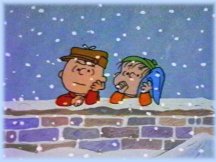
A Healing Place in CyberSpaceTM

Good Grief! I’m Having
a Charlie Brown Xmas
How to Deal with the Holiday
Blues
Kirsti A. Dyer, MD, MS, FAAETS

Charlie Brown felt so depressed.
"I just don’t understand Christmas. Instead of feeling happy, I feel sort of let down."
This year as I watched the Charlie Brown Christmas
special for the umpteenth time, I found myself suspecting that he was experiencing
a "Charlie Browniest Christmas" or a case of the "Holiday Blues." As the
show proceeded he revealed his feelings about Christmas, "I think there’s
something wrong with me. I just don’t understand Christmas. I like getting
presents, sending cards, decorating tress and all that. But I always end
up feeling sad." Listening to these comments I became even more sure of
my diagnosis. I found it strange that even though I have watched the program
nearly every holiday, until this year I had never noticed how blue about
the holiday Charlie Brown really was.
The Holiday Blues - Why am I
feeling like Charlie Brown?
People often have different experiences of the
holidays. For many, it is a time of joy, happiness, peace on earth, good
will, celebrating with family and friends, and hope for the future. But
for others, the holiday season can be a difficult time, a time of sadness
and loneliness, a time of self evaluation and reflecting on past accomplishments
and failures, and a time of anxiety about the future year. During this
time of year there is a high potential for psychological, physical and
financial stress. As a result, the holidays can leave millions of people
feeling blue, not happy or merry. The holiday blues can affect men and
women of all ages with intense and unsettling feelings ranging from mild
sadness to severe clinical depression. Based on his description of how
he is feeling, Charlie Brown appears to have a classic case of the Holiday
Blues.
The holiday season can also be especially difficult for those who have lost a loved one and are facing the first or the umpteenth season without them. For those who have experienced a significant loss or change during the year, it is normal to feel subdued, reflective and blue like Charlie Brown "I don’t understand Christmas.…Instead of feeling happy, I feel sort of let down." Laughter and happiness are perceived as sentiments for others, not for someone grieving a loss. The joyful public celebrations and media portrayal of the "perfect" holiday can be painful reminders of what the grieving person is missing. Memories of holiday season's past will invariably surface, or thoughts of a season that will never be; these remembrances and reflections can trigger an episode of the blues. It is normal for the holidays to exaggerate feelings of stress, sadness and loneliness.
Other factors can contribute to the stress, loneliness,
and sadness experienced during the holidays.
Those separated from loved ones by circumstances,
distance or death can find this season to be an intensely painful time,
one that further reminds them of how much they are alone. The increased
demands of shopping, parties, family reunions, and house guests leave many
feeling overwhelmed by their holiday obligations. The over commercialization
of the Holidays by retailers makes one begin to believe this time of year
is synonymous with "buying" and "spending" and no longer about "caring"
and "sharing." The spirit of the season seems to have been lost in a corporate
take-over, or fired in a managerial down-sizing. Financial hardships
during a slowing economy, a time of rising unemployment and the multitude
of end-of-the-year layoffs may severely limit what people can spend this
year. Add to this the idealistic plans of trying to create the perfect
"Martha Stewart Holiday," unrealistic expectations may be raised which
may be impossible to meet.
The Blues During Medical School
and Training: A Personal Experience
For many of the years during my medical training—medical
school and residency—I would find myself slipping into the holiday blues
before Thanksgiving emerging sometime after Valentine's Day. I also have
a birthday over the holiday season near New Year’s Eve, so both of these
occasions served as a time of self reflection. I would spend these days
looking back on the year that was and where I was in my life—personally,
professionally, and economically. I did not meet my husband until after
I completed my residency training, so I spent holidays during medical school
and residency as a single person. Adding to my world of being alone were
the seemingly endless reminders from Thanksgiving through Valentine’s Day
by advertisers—the images of happy couples and happy families having the
perfect holiday. These constant media reminders only made things worse
underscoring that my personal life was nonexistent. I believed the holidays
were for children and for those in love. Not being either made it an extremely
difficult time. Professionally, I found there was often little to look
forward to during this season. In the midst of medical training the end
is often no where in sight and there are no guarantees of finishing. Additionally
as with so many other interns and residents, being the low people in the
medical residency hierarchy, I was often scheduled to work on the weekends
and holidays. Surprisingly for me, I discovered that working was better
than being home pining for a person that did not exist in my life, being
away from family and friends, and feeling quite lonely. Economically the
holidays during my education and training years were hard. The resources
didn’t exist to do something fun, even if I’d had the time off and the
energy with which to do so. I felt like Charlie Brown, thinking there was
something wrong with me for feeling sad at Christmas. "Good Grief! I’m
having a Charlie Brown Xmas."
After seven years of feeling blue and having Charlie Brown Christmases, my final year of training 1995, I decided to change how I was viewing my life, my situation and stop turning Christmas into a problem. I began looking for positives rather than only seeing the negatives, focusing on the true reasons for the season—peace and good will. I consciously started behaving more compassionately so I would feel better. Altruism, performing acts of kindness selflessly for others, was my way of coping and surviving. That year I decided if I couldn’t be with my family, friends or someone that I loved then I would create a family and find friends for whom I could do Christmas things and spread some holiday cheer. Thus, Christmas 1995 I experienced several unexpected blessings. I called a few of my physician girlfriends, friends, and family members who were also alone for the season. Reaching out over the phone and connecting with someone else who was also feeling lonely made the season more bearable. As a senior resident I insisted on covering for one of the interns so she could make it to her family celebration—the first big Christmas for her 2 year-old son. Looking back on this gesture, I now realize as my own 21 month-old daughter is nearing her first big Christmas, just how special the simple "gift" of my time was to this female intern. Several of the other ways I used for coping during my training are included below.
Coping with the Blues During Medical Training
 Fortunately,
Charlie Brown’s feelings of depression and sadness were short-lived. He
didn’t require medication or extensive therapy to deal with his blues.
He needed to be around people and have a trusted friend (Linus) support
him during this time. Charlie Brown’s symptoms lessened following his involvement
in the Christmas play. His spirits lifted after listening to Linus explain
what Christmas was really all about…"Peace on Earth, Good Will to Men."
As Linus remarked about the bedraggled, little "Charlie Brown" tree that
they selected, "It’s not a bad little tree, really. It just needs a little
love." These words could also be applied to Charlie Brown. He just needed
someone to give him a little tender loving care.
Fortunately,
Charlie Brown’s feelings of depression and sadness were short-lived. He
didn’t require medication or extensive therapy to deal with his blues.
He needed to be around people and have a trusted friend (Linus) support
him during this time. Charlie Brown’s symptoms lessened following his involvement
in the Christmas play. His spirits lifted after listening to Linus explain
what Christmas was really all about…"Peace on Earth, Good Will to Men."
As Linus remarked about the bedraggled, little "Charlie Brown" tree that
they selected, "It’s not a bad little tree, really. It just needs a little
love." These words could also be applied to Charlie Brown. He just needed
someone to give him a little tender loving care.
The Holiday Blues tend to be short-lived lasting only a few days to a few weeks around the holiday season. The emotions—sadness, loneliness, depression, anxiety—usually subside after the holidays once a daily routine is resumed. However, if the symptoms of hopelessness and depression last for more than two weeks, persist past the holidays, or intensify during the season, a simple case of the blues may in reality be a serious case of depression. Concerning symptoms include:
Remember to REST during the Holidays
The key to coping with the Holiday Blues is in
understanding them. Setting realistic expectations for the holidays, knowing
what people, events, thoughts or memories can trigger feeling sad, blue
or depressed, developing ways of responding to these feelings and being
around supportive people can all be helpful in coping with the holidays.
Most of all it is important to remember to get your R-E-S-T:
Reasonable expectations and goals. Be realistic about can and cannot be done. Get plenty of rest.Final Thoughts
Exercise, even walking daily. Eat and drink in moderation. Enjoy free activities.
Simplify to relieve stress. Set a budget for time, social obligations and gifts. Simple gifts can bring happiness - give service coupons, spend time together, donate to charity, call or visit a friend.
Take time for yourself for relaxation and remembrance. Give time to others—volunteer. Spend time with caring, supportive people. Keep in mind that Traditions can be changed.
I continue to have some non-seasonal "career blues" pondering how best to balance the new role of mother with the demands of a medical career. Thankfully my holiday blue periods have diminished since finding my husband, getting married and having our first child. By Christmas 1996, a year after I had decided to shift my way of dealing with the season, I was engaged. By Christmas 1997, I was married. By Christmas 2000 we had welcomed our first daughter. This Christmas 2001 I am expecting our second child.
It is difficult to determine how much of my change in experiencing the blues is due to being away from the stressors and pressures of medical training, how much is due to being in a stable relationship, and how much was due to the internal shift in attitude. One has to wonder how much of my holiday blues were caused or at least exacerbated by the stressors of medical education and training. Once out on my own, I have had more of a say in my work schedule and how I am treated. I do know, for a fact, that several of my single physician colleagues still dread their holiday season, indicating that there may be some inherent stressors present in just practicing medicine.
This year in particular, with all that has happen in the world, it is even more a year of reflection and a time to count blessings. As I watch my 21 month-old daughter understand Christmas for the first time, see the wonder and magic of the season through her eyes, and begin to start our own family traditions, I feel very fortunate. We also feel blessed with another healthy pregnancy that is going well. With luck we will have our second daughter sometime around Easter. My husband and daughters, my cherished non-monetary "gifts" are far better than any present I could ever receive. They are also my best personal cure for the blues.
Note: I am
interested in hearing other ways that other medical students, residents
and physicians, have of coping with the holidays, special remembrances,
or traditions used by families to honor departed loved ones. E-mail me
at griefdoc@kirstimd.com. The
suggestions may be included in updates to this article.
Online Articles for More Information:
Center for Disease Control
Preventing the Holiday Blues. Last Updated October
31, 2001. Available at: http://www.cdc.gov/safeusa/blues.htm
National Mental Health Association
Coping During This Holiday Season 2001. Available
at: http://www.nmha.org/reassurance/holiday.cfm
Holiday Depression & Stress. 1998. Available
at: http://www.nmha.org/infoctr/factsheets/103.cfm
MentalHealth.org
Highlights Holiday Blues. December 2000. Available
at: http://www.mentalhealth.org/highlights/December2000/holidayblues/
Journey of Hearts
Dyer KA. The Holidays 2001: Coping in the Year
of Change & Uncertainty. December 7, 2001. Available at: http://www.kirstimd.com/blues_01.htm
Dyer KA. Basics about the Holiday Blues. December
9, 1998. Available at: http://www.kirstimd.com/blues1.htm
Dyer KA. More Suggestions for Dealing with the
Holiday Blues. December 13, 1998. Available at: http://www.kirstimd.com/blues.htm
National Organization for Victim Assistance
Spender S. Surviving the Holidays after September
11, 2001: Ten Thoughts on Coping. October 27, 2001. Available at: http://www.try-nova.org/holidaycoping_september11.html
American Association for Geriatric Psychiatry
Holiday Blues or Depression. Available at: http://www.aagpgpa.org/p_c/blues.asp
Good Assessment for Depression.
American Institute of Preventive Medicine
Powell DR. Defeat the Holiday Blues. American
Institute of Preventive Medicine. February 1999. Available at: http://cbshealthwatch.medscape.com/cx/viewarticle/150090
Charlie Brown Quotes taken from:
Schulz CM. A Charlie Brown Christmas. New
York, N. Y.: Little Simon, 2001.
Last updated December 11, 2001

This article also
appears on the MomMD.com website.
All material, unless
otherwise specified, is © 1997-2001 by Journey of Hearts A Healing
Place in CyberSpace. Information on this site may be shared with others,
but is not for general distribution by for-profit ventures.
To contact the
Domain Designer email to griefdoc@kirstimd.com
To return to home page.